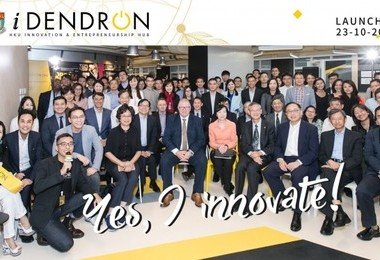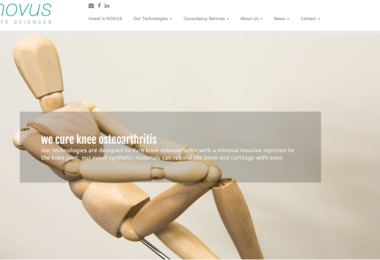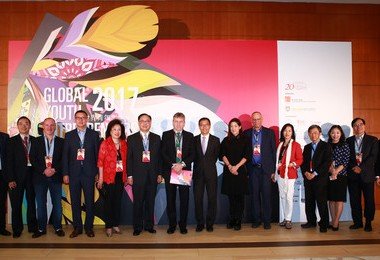KE Spotlight
Filter
-

HKU launches Innovation & Entrepreneurship Hub: iDendron
HKU held a launch ceremony on October 23 for iDendron, which serves as a co-working space, event space, and collaborative community for students, staff and alumni and partners. It will facilitate the partnerships of entrepreneurs, innovators and pioneers, through anchor programmes such as DreamCatchers and Entrepreneurship Academy, and with the Hong Kong Science and Technology Parks Corporation, Hong Kong X-Tech Startup Platform and Cyberport CUPP, etc. Twenty startup teams, led by HKU students and young alumni, have moved in and are working on their projects. The establishment of this innovation and entrepreneurship hub on campus was enabled by the Azalea (1972) Endowment Fund and supported by Sino Group and Stanley Chu.
Read More -

HKU student develops food recognition mobile app Marketeer
HKU Isreali student Mr Daniel Edelson developed Marketeer, a mobile app that recognises fresh food sold in Hong Kong’s wet markets and traditional shops. He utilised Artificial Intelligence with Machine Learning capabilities for recognition of a wide variety of food. The user can get all the information needed according to his/her health condition, body type, and nutritional goals. The app has got a start-up fund totalling HKD $600,000, from HKU DreamCatchers, Cyberport, IBM and the Social Innovation and Entrepreneurship Development Fund. Mr Edelson plans to upload the app on Android in three months.
Read More -

HKU graduates' start-up team develops new bone substitute
Novus, a start-up company formed by an HKU Faculty of Medicine PhD graduate with two fellow PhD students and a winning team of the HKU DreamCatchers 100K Entrepreneurship, developed a new bone substitute which can be applied in a variety of bone-related surgical procedures and will soon be tested in animal total hip replacement. The company will partner with CityU's School of Veterinary Medicine to sponsor NGO Paws Guardian free surgeries for stray dogs.
Read More -

Global Youth Entrepreneurs Forum 2017 takes place at HKU
The Hong Kong Federation of Youth Groups and HKU DreamCatchers jointly organised a two-day Global Youth Entrepreneurs Forum 2017 attended by over 1,000 young entrepreneurs from 33 countries and regions around the world under the theme "WE THE FUTURE".
Read More -

Four HKU teams win in Cyberport University Partnership Programme 2016
The Cyberport University Partnership Programme (CUPP) is a FinTech-focused entrepreneurship programme launched in 2015 by Hong Kong Cyberport Management Company Limited. This year, 20 student teams were selected from six universities in Hong Kong to join a 1-week long startup bootcamp at Stanford University Graduate School of Business (GSB) in September. They pitched their FinTech ideas at the final held on October 27 to compete for ten HK$100,000 awards from the Cyberport Creative Micro Fund. All four HKU teams won in the final.
Read More -

HKU develops novel probiotic mixture "Prohep" that may offer potential therapeutic effects on liver cancer
A research team led by Dr Hani El-Nezami and Dr Gianni Panagiotou of the HKU School of Biological Sciences, in collaboration with the HKU Li Ka Shing Faculty of Medicine and the School of Medicine, University of Eastern Finland, develops a novel probiotic mixture "Prohep" that may have potential therapeutic effects on Hepatocellular carcinoma. The research team found that Prohep, when tested on mice, could slow down the tumor growth significantly and reduce the tumor size and weight. Future research would be to find out how to consume the probiotic mixture to obtain the best results, and to develop more efficient bacterial cocktails. The commercialization of Prohep is being assisted by the HKU Technology Transfer Office and Versitech Limited.
Read More -

HKU scientists effectively suppress tumour growth by converting Salmonella into YB1 anaerobe bacterium
Researchers at the HKU School of Biomedical Sciences have recently engineered Salmonella into an anaerobe bacterium named YB1 that can only survive and thrive in the hypoxic condition, for example, hypoxic regions inside solid tumours. YB1 can effectively inhibit the growth of tumours while being safe to normal tissues. The patent applications for this invention have been filed in different countries through the Technology Transfer Office of HKU. A patent was recently granted by the United States Patent and Trademark Office. The researchers hope that YB1 can be further developed into a tumour-targeting agent in the near future.
Read More

